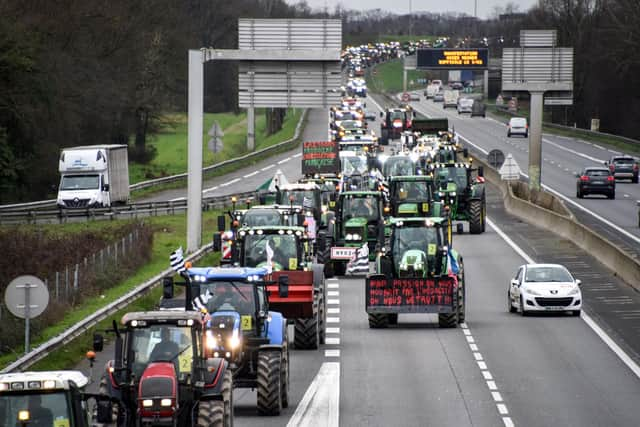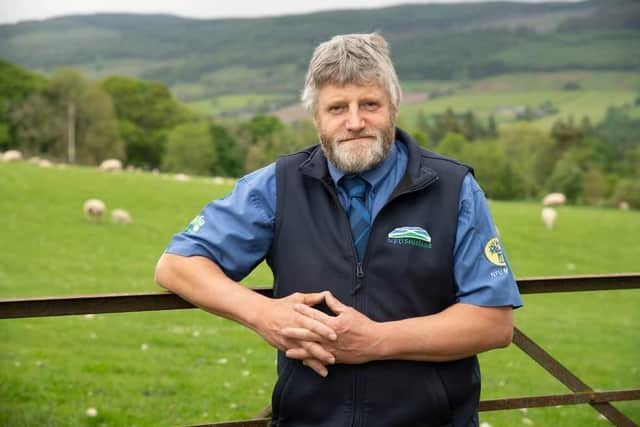EU farmer protests: Here's why discontent in Scotland's farming industry is different to those on the continent
In the wake of historic farmer protests across Europe, eyes have been on the UK farming industry to see if it too will rise up against its own governments.
The demonstrations have been sweeping the continent for months with farmers protesting against regulation, income pressure and bureaucracy in countries such as Germany, Poland, Greece and France, where the government was taken by surprise this week by a motorway blockade of Paris.
Advertisement
Hide AdAdvertisement
Hide AdThe energy is beginning to be felt on UK soil, with dozens of protests staged by Irish farmers across the country this week in solidarity with EU farmers.


Elsewhere hundreds of farmers gathered for a crunch meeting to discuss the future of farming in Wales amid intensifying anger against Welsh government policies.
A poll published in UK farming publication Farmers Weekly asking its readers if there should be a Europe-style protest in Britain showed 62 per cent in favour with 38 per cent against.
The discontent does not come as much of a surprise with farmers across the UK have been increasingly frustrated and concerned about inequality within the supply chain, which currently sees many receiving unfair prices for their produce while retailers show record profits.
The National Farmers Union Scotland (NFUS), however, said while it sympathises with its peers across the water, with Belgium being the latest to see its capital descended upon, the battle is different on the ground at home.


The EU farmer protests have been triggered by a multitude of reasons that vary from country to country, but one communal grievance is the feeling that their livelihoods are threatened by the EU Green Deal. One key element of this agenda is to cut the use of the nitrogen-based fertilisers that have enabled higher and more reliable crop yields from smaller land areas over the past century. The protests escalating is also likely linked to the upcoming European elections which are taking place this summer.
NFUS president Martin Kennedy said frustrations in the Scottish farming industry lie more with questions over future funding.
He said it is clarity on future agricultural payments and budget in Scotland “that are foremost in the minds of Scottish farmers and crofters at this time.”
Advertisement
Hide AdAdvertisement
Hide AdScotland is the only country in the UK without a firm indication of what is going to replace the basic payment for farmers since changes were made to the subsidy system during Brexit.
Farmers have been crying out for more clarity on financial details of the new tiered subsidy scheme, of which just a template has been dangled in front of them so far, so that they can plan ahead for their businesses.
Mr Kennedy said farmers are also still waiting for answers to questions on when and how all budget cuts and deferred payments from the Scottish agricultural budget will be returned.
Earlier this week, calls were made for First Minister Humza Yousaf to “stop using farmers as a scapegoat” and return the remaining £46m of funding to the Scottish agriculture. This sum was slashed from the budget, but with the promise the cash would be returned to the rural portfolio.
Rural affairs secretary Mairi Gougeon responded saying the money is ringfenced “so it has to be returned”, and that the deputy First Minister Shona Robinson had confirmed the remaining deferred funds will be returned “in full” and “to be spent on the right agricultural priorities at the appropriate time.”
But a fear of “just warm words” has meant the union’s calls will be ramped up next week at the NFUS AGM where Mr Yousaf is expected to deliver a keynote speech, while rural affairs secretary Ms Gougeon will be in attendance to host a question and answer session.
The meeting will also hear the results of the first part of the largest ever survey of Scottish supermarket shelves which has seen researchers look at beef, lamb, pork, chicken, soft fruit, vegetables and dairy products on offer in Tesco, Asda, Morrisons, Sainsbury’s, Co-op, Marks and Spencer, Lidl and Aldi stores. The survey will look at the country of origin of the goods being offered, identify if they are Scottish, British or imported, and also look at the price. NFUS, which commissioned the study, said the aim is to ensure giant retailers are “meeting their responsibilities to help tackle the deepening food security crisis.”
While no tractors are expected to be rolling into Edinburgh any time soon, this year has already seen demonstrations and packed out community meetings where farmers have made their frustrations with government policy heard.
Advertisement
Hide AdAdvertisement
Hide AdEarlier this month, 70 farmers descended on the Cairngorms National Park Authority (CNPA) headquarters in Grantown-on-Spey, in protest over the lack of engagement over environment-led plans for the park, including the recent beaver reintroduction.
And this week, vice president of the NFUS Alasdair Macnab chaired a meeting about the Isle of Skye being put forward as one of Scotland’s next national parks.
The meeting was attended by a staggering 110 farmers, crofters and other local stakeholders who all indicated that they did not support the creation of on in their area.
The Scottish Government has committed to designating at least one new national park in Scotland by the end of this parliamentary session in 2026, with nominations opening in October last year.
The NFUS said the unanimous no was based on the experience of many farmers and crofters currently living and working in either the Cairngorms National Park or the Loch Lomond and Trossachs National Park, some of which have said they are more at a disadvantage than those living outside the boundary.
One of the reasons they cited is claiming their livelihoods are being pushed out by Scottish Green-led environment policies such as tree planting initiatives and certain species reintroduction plans rather than engaging them in the conversation.
Comments
Want to join the conversation? Please or to comment on this article.